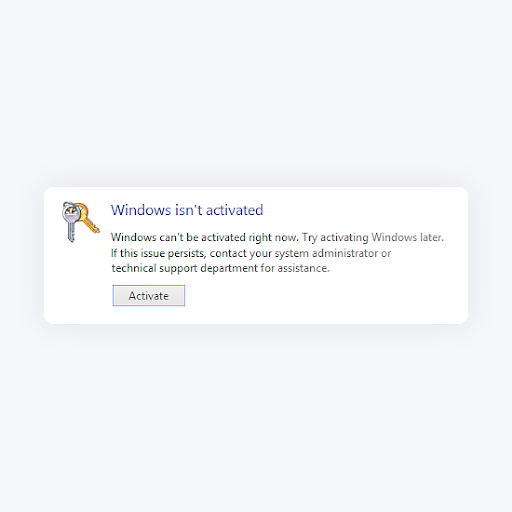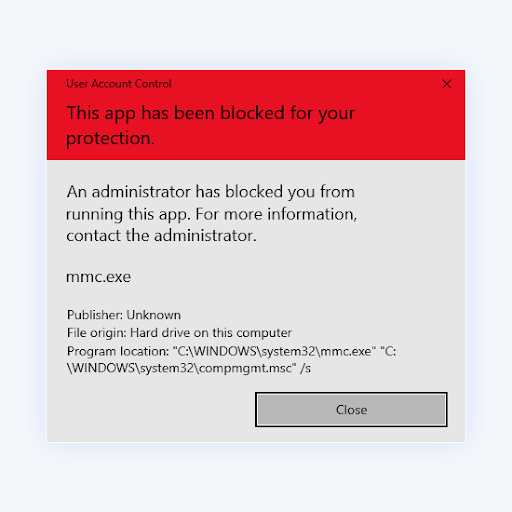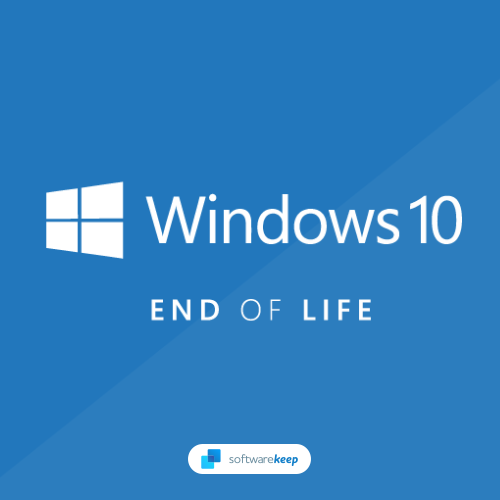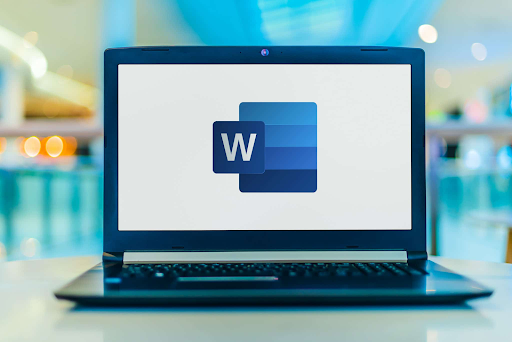SSD vs HDD: Understanding the Key Differences between SSDs and HDDs
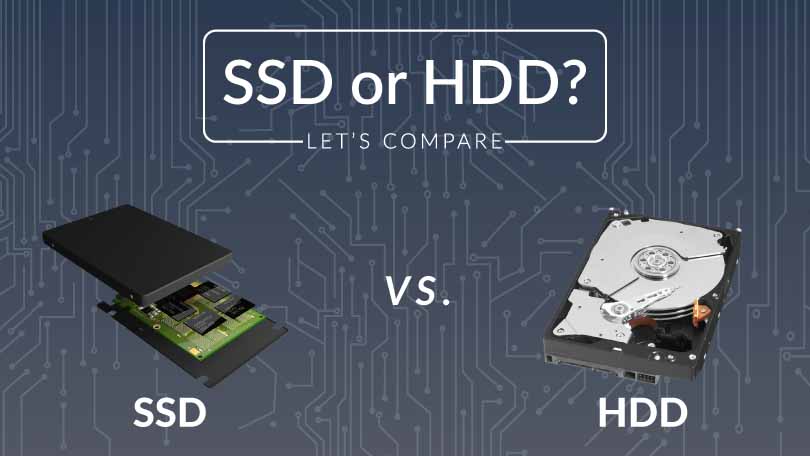
Wondering about SSD vs HDD? This guide help yo understand the difference between SSDs and HDDs and how to make the right choice about your storage location.
What is a solid state drive (SSD)?
Solid state drives (SSDs) are newer disk types that store information on flash memory consisting of individual memory cells storing bits that are instantly accessible by the controller. SSD speeds vastly outpace HDD speeds, and the rapid data transfer drastically improves your computer’s performance.
So, how do SSDs make your computer faster?
SSDs improve the speed at which large data amounts are loaded at once. The following processes work faster with an SSD:
- Booting up your operating system
- Starting a program
- Loading a new video game level
- Opening a huge file in a resource-intensive program
- Importing and exporting video files
- Previewing video files in editing software
When we talk about performance, we mean the transfer of large bunches of data all at once. An SSD won’t necessarily help Chrome run more smoothly when 100 tabs are open and your overall RAM is low, and video editing software will struggle if your processor is many years old.
What is a hard disk drive (HDD)?
An HDD enclosure contains a series of platters covered by a ferromagnetic coating. The direction of the magnetization represents the individual bits. Data is written and read by a fast-moving head, similar to how vinyl record albums work. The disk spins at 7200 RPMs so data can be read very quickly.
Since all of these pieces are mechanical, the hard disk is any computer's slowest and most fragile component. But HDDs can be extremely cost-efficient for long-term offline storage, as most of the benefits of an SSD over HDD are only related to day-to-day usage — for example, the rate at which they can load large files and programs.
If you’re wondering whether you have an SSD or HDD, here’s how to find out: Type defrag in the Windows start search bar, and click Defragment and Optimize Drives. You’ll see a list of drives connected to your computer and their type.
Checking your other PC specs is easy, too: type About in the taskbar and click About My PC.
What is the Differences between SSD and HDD?
When it comes to computer storage and performance, choosing between a solid-state drive (SSD) and a hard disk drive (HDD) can be tough. Both have their advantages and disadvantages, and it can be difficult to know which one to choose.
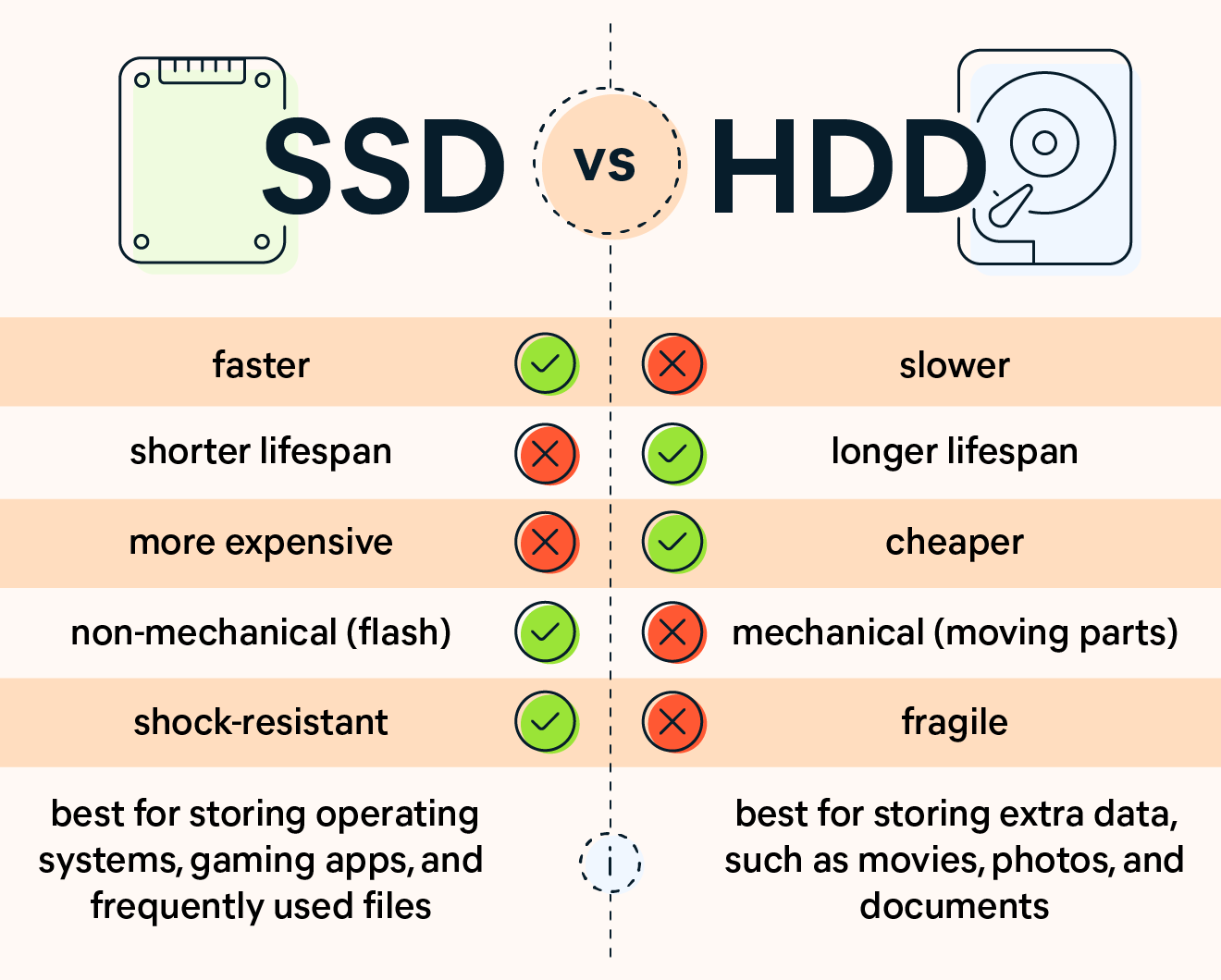
The main difference between a Solid State Drive (SSD) and a Hard Disk Drive (HDD) is their storage technology.
HDDs are traditional storage devices with spinning platters that read, write, and store data. SSDs use a newer storage technology that stores data on instantly accessible memory chips. SSDs are faster, quieter, smaller, consume less energy, and are more durable.
Here is a more expansive explanation of how SSD and HDD compare:
Speed
One of the main differences between SSDs and HDDs is speed. SSDs are much faster than HDDs because they use flash memory, which has faster data access times. This means that data can be read and written much more quickly on an SSD than on an HDD.
Data Access
SSDs have significantly faster data access times compared to HDDs. This means that when you try to open a file on an SSD, you'll get it almost instantly. On an HDD, you might have to wait a few seconds for the file to load.
Load Time
Load times are also much faster on an SSD compared to an HDD. For example, if you're playing a game, it will take much less time for the game to load on an SSD compared to an HDD. This is because the SSD can quickly read the data it needs to run the game, while an HDD takes longer to access the same data.
Capacity
Another difference between SSDs and HDDs is capacity. HDDs typically come in much larger capacities, with options ranging from 500GB to 4TB. On the other hand, SSDs are typically limited to a maximum of 2TB.
Performance
The performance of an SSD is much better than that of an HDD. This is because SSDs don't have any moving parts, which means there are fewer opportunities for things to go wrong. Additionally, SSDs are much faster than HDDs, which means that your computer will be able to perform better overall.
Latency
Finally, SSDs have much lower latency compared to HDDs. Latency refers to the amount of time it takes for a device to respond to a request. With lower latency, an SSD can respond more quickly to requests, which can result in improved overall performance.
Pros and Cons: Comparison of SSD vs HDD
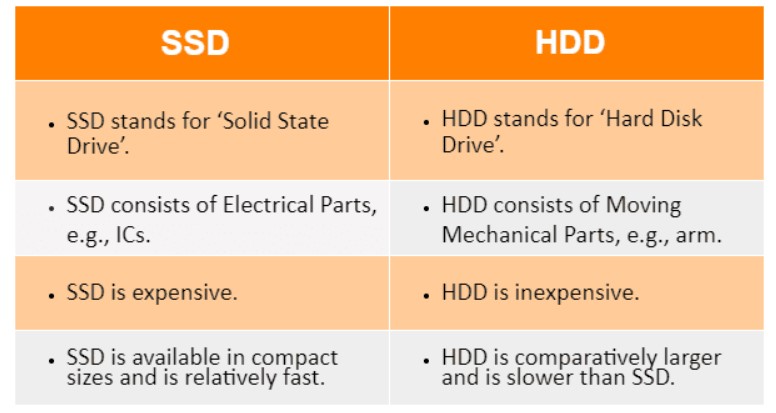
Advantages of SSD vs HDD
Speed
One of the biggest advantages of an SSD is its speed. As we've seen, SSDs are much faster than HDDs, which means that your computer will be able to perform better overall.
Reliability
Another advantage of SSDs is that they are much more reliable than HDDs. This is because SSDs don't have any moving parts, which means there are fewer opportunities for things to go wrong. Additionally, SSDs are less likely to suffer from physical damage, which is a common issue with HDDs.
Power Consumption
Finally, SSDs are much more energy-efficient than HDDs. This is because SSDs don't have any moving parts, which means they don't require as much power to operate. This can result in longer battery life for laptops, and lower energy bills for desktops.
Capacity
One of the biggest advantages of an HDD is its capacity. As we've seen, HDDs typically come in much larger capacities than SSDs, which means you can store more data on an HDD.
Price
Another advantage of HDDs is that they are typically much less expensive than SSDs. This makes HDDs a more cost-effective solution for those who need a lot of storage space but don't need the speed of an SSD.
Disadvantages of SSD vs HDD
Price
One of the main disadvantages of SSDs is their price. SSDs are more expensive than HDDs, which can make them less accessible for some people.
Speed
HDDs suffer a speed disadvantage when compared to SSDs. HDDs are much slower than SSDs, which can result in slower overall performance.
Reliability
Another disadvantage of HDDs is that they are not as reliable as SSDs. This is because HDDs have moving parts, which can break or wear down over time. Additionally, HDDs are more likely to suffer from physical damage, which can result in data loss.
Comparison for Different Use Cases
How do SSD vs HDD compare in terms of use:
SSD vs HDD lifespan: What are the differences
The lifespan of an SSD is determined by the number of write cycles it can perform. A write cycle is a process of saving data to the drive. An SSD can typically perform several write cycles before it fails. SSDs are rated for a lifespan of several more years compared to HDDs.
In addition, an HDD's lifespan is determined by its moving parts' wear and tear. Over time, the spinning disks and mechanical parts in an HDD can wear down, causing the drive to fail. This can happen due to normal use, vibration, or other factors.
Gaming
For gamers, an SSD is the better choice. This is because games often require a lot of data to be loaded quickly, and an SSD can do this much faster than an HDD. Additionally, the improved overall performance of an SSD can result in a more enjoyable gaming experience.
Laptops
For laptop users, an SSD is also the better choice. This is because laptops often have limited storage space, and an SSD can provide more space for important files and applications. Additionally, the improved performance and lower power consumption of an SSD can result in longer battery life for your laptop.
Desktops
For desktop users, the choice between an SSD and an HDD is more complicated. If you need a lot of storage space, an HDD is the better choice, as they come in larger capacities. However, if you want the best overall performance, an SSD is the way to go.
File Transfers
For those who frequently transfer large files, an SSD is the better choice. This is because the speed of an SSD means that file transfers will be much faster, which can save you a lot of time.
Upgrade from HDD to SSD
If you're currently using an HDD, you may be considering upgrading to an SSD. There are several benefits to this upgrade, including:
Speed
One of the biggest benefits of upgrading from an HDD to an SSD is the speed increase. As we've seen, SSDs are much faster than HDDs, which can result in improved overall performance.
Reliability
Another benefit of upgrading to an SSD is improved reliability. This is because SSDs are much more reliable than HDDs, which means you're less likely to suffer from data loss or other issues.
However, there are also some drawbacks to consider when upgrading from an HDD to an SSD.
Price
One of the biggest drawbacks of upgrading to an SSD is the price. As we've seen, SSDs are more expensive than HDDs, which can make the upgrade a costly investment.
SSD and HDD form factors
SSD storage comes in various shapes and sizes. Initially, SSDs mimicked the size and shape of the most common HDDs for easy upgrading. Now, many SSDs are very small devices because they lack moving parts.
You can find SSDs in smaller form factors, like the M2 SSD. While more expensive, these SSDs save a ton of space and install directly into the motherboard without the need for a cable. M2s can use either SATA or NVMe to communicate with the motherboard; however, you’ll need to check if your motherboard is compatible with the M2 drive you want.
Why are SSDs useful for laptops?
SSDs are often used in laptops because they're non-mechanical. They require less power, which translates into better battery life.
While hard disks have moving parts, SSDs are shock-resistant. If you drop your laptop while a hard drive's read/write head is in motion — which it usually is — it could result in data failure. This doesn’t happen with SSDs.
But it isn’t always an either/or choice. “Hybrid” computers have both drive types — the operating system, apps, and files are installed on an SSD, while other data sits on an HDD. Using your SSD to run your OS and apps in a hybrid setup greatly increases SSD performance.
SSD vs HDD FAQ
What is the difference between an SSD and an HDD?
An SSD uses flash memory to store data, while an HDD uses spinning disks. SSDs are faster, more energy-efficient, and more reliable than HDDs, but they are also more expensive and come in smaller capacities.
Which is better, an SSD or an HDD?
The choice between an SSD and an HDD depends on your specific storage needs and budget. If you need faster performance and higher reliability, an SSD may be the better choice. If you need more storage space and a lower price, an HDD may be a better option.
Is a 256gb SSD better than a 1TB hard drive?
A 256GB SSD will serve you better than a 1TB HDD if you want faster write and read speeds. However, the storage space would be minimal. If you are a pro gamer or a video editor, you can go with a 260GB SSD. The 1TB HDD storage option only has one advantage: its 1TB storage space.
What’s the lifespan of an SSD?
These days, the lifetime of an SSD is nearly the same as that of an HDD: around five years on average. A bad device may fail after three years, but a good one can last you ten or more. SSDs used to have shorter lifespans, but SSD technology has improved substantially.
How does the lifespan of an SSD compare to that of an HDD?
The lifespan of an SSD is determined by the number of write cycles it can perform, while the lifespan of an HDD is determined by the wear and tear on its moving parts. In general, SSDs are more reliable and have a longer lifespan than HDDs.
Is an SSD faster than an HDD?
Yes, an SSD is typically faster than an HDD because it uses flash memory to store data, which allows for faster data access times.
Is an SSD more reliable than an HDD?
Yes, an SSD is typically more reliable than an HDD because it has no moving parts that can break down over time.
Is an SSD more expensive than an HDD?
Yes, an SSD is typically more expensive than an HDD, especially for larger capacities.
Is an SSD more energy-efficient than an HDD?
Yes, an SSD is typically more energy-efficient than an HDD because it uses less power and generates less heat.
Can an SSD replace an HDD?
In most cases, an SSD can replace an HDD as a primary storage device.
Can I use an SSD and an HDD together in the same computer?
Yes, you can use an SSD and an HDD together in the same computer. The SSD can be used as the primary storage device for the operating system and frequently used programs, while the HDD can be used for storing large files, such as music and video collections.
What about capacity differences between HDDs and SSDs?
If you’re concerned about how much information you can store on each type of drive, don’t worry. There are no differences in storage capacity. You can get HDDs and SSDs from as small as 128 GB up to 20 TB or more. However, one of the biggest differences between HDDs and SSDs is the price per gigabyte, so the SSD will be much more expensive.
2023's Best NAS & HDD Combo
Conclusion
In conclusion, choosing between an SSD and an HDD is a matter of understanding your storage needs and budget.
SSDs are faster, more reliable, and more energy-efficient than HDDs but are also more expensive.
HDDs offer more storage space at a lower price, but they are slower and less reliable.
Make the right choice based on your storage, speed, and performance needs.
One more thing
We’re glad you’re read this article/blog upto here :) Thank you for reading.
If you have a second, please share this article on your socials; someone else may benefit too.
Subscribe to our newsletter and be the first to read our future articles, reviews, and blog post right in your email inbox. We also offer deals, promotions, and updates on our products and share them via email. You won’t miss one.
Related articles
» How to Check SSD Health on Windows 11
» How to Fix an Unexpected Store Exception Error in Windows 10
» How to Download Standard SATA AHCI Controller Driver on Windows 10
» How To Format a Hard Drive That Won’t Boot?
» How to Merge Partitions in Windows 10


